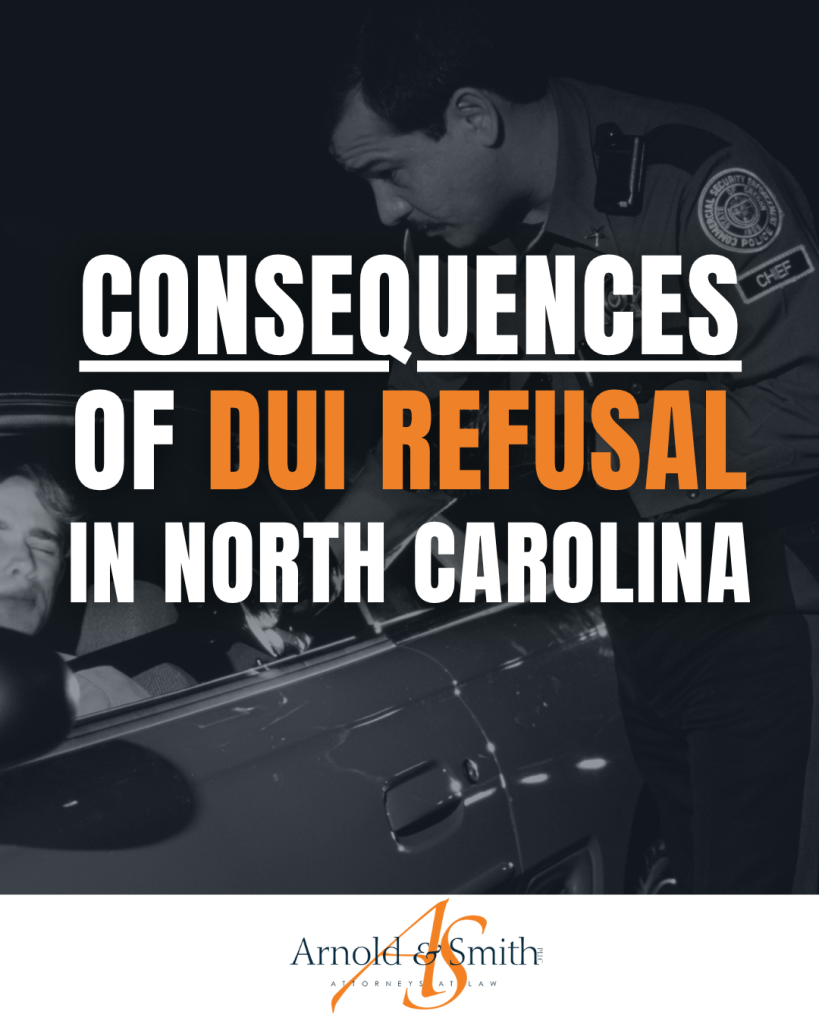 Consequences of DUI Refusal in North Carolina
Consequences of DUI Refusal in North Carolina
Police officers are focused on public and road safety and are required to enforce the law. If you are pulled over for a traffic violation, the police may want to determine whether you are impaired. The legal limit in North Carolina is 0.08% BAC. Blood alcohol content (BAC) is a measurement of the concentration of alcohol in your system. The police may have you perform some standardized field sobriety tests (SFSTs), and they may also ask you to take a preliminary breath test to help determine whether you are impaired. They may then transport you to the police station, where they conduct an evidentiary DUI test.
Understanding Implied Consent
It is important to understand the concept of implied consent. Every driver in North Carolina consents to submitting to a DUI test when requested by a member of law enforcement. A person cannot receive a driver’s license in North Carolina unless they agree to submit to DUI tests. Therefore, anyone with a license has already consented to a DUI test. The failure to submit to the test can thus result in severe consequences that are separate from the initial DUI charge. A driver is not required by law to submit to a preliminary breath test.
Preliminary Breath Tests
Implied consent applies only to evidentiary DUI tests – the type of tests that are done at the police station. The law does not apply to preliminary DUI tests that are completed at the side of the road during a traffic stop. Preliminary breath tests are the type that members of law enforcement carry with them to use when needed. The portable breath test requires the driver to blow into the device for a number of seconds until a reading is obtained. A preliminary breath test is often considered less reliable than a breathalyzer, urine, or blood test.
DUI Refusal
When someone refuses to take a DUI test, police and the courts often refer to this as a “willful refusal” or DUI refusal. This is the deliberate refusal to submit to a breath, blood, or urine BAC test after being arrested. Refusing to submit to a DUI test will result in separate charges that require an automatic revocation of your driver’s license for a period of one year. This is a civil infraction and is effective regardless of what happens with the DUI charges.
What Happens if I Refuse a Preliminary Breath Test?
The preliminary breath test (PBT) is an alcohol screening device that police use to help them determine impairment. PBTs are voluntary, and the implied consent law does not apply to them. However, it is important to realize that if you refuse a roadside breath test, the officer may still have other indicators that show you may be impaired. When you refuse a PBT, the police will likely arrest you on “suspicion of DUI” and will take you to the station to perform an evidentiary DUI test. Keep in mind that you are allowed to request your own testing as well.
If you have been asked to submit to a DUI test, you will want to consider refusing it very carefully. It may be best to allow the test and deal with the legal consequences of a possible DUI later rather than have to worry about a separate charge for DUI refusal. If you are in this situation, call your attorney immediately to provide guidance based on the facts of your case. To discuss the matter with a qualified DUI attorney, call us at Arnold & Smith, PLLC, at (704) 370-2828.
The criminal defense attorneys at Arnold & Smith, PLLC make it their mission to zealously defend their clients on a wide range of criminal matters at both the state and federal levels. These matters may include any charge from traffic offenses; DWI/DUI; drug charges (from simple possession to possession with intent to distribute and trafficking); gun permit denials; weapons offenses; and property crimes (larceny, breaking and entering, robbery, fraud, embezzlement, white collar offenses); to sexually related offenses (indecent exposure; sexual assault, crimes against nature, removal from sex offender registry); and violent crimes (domestic violence; assault; manslaughter; homicide, murder). Other legal issues that Arnold & Smith, PLLC criminal clients may be facing include restraining orders, restraining order and probation violations, expungements; appeals; and immigration issues related to criminal charges. Our criminal defense attorneys are passionate about ensuring that individuals empower themselves by being informed about their constitutional rights, and stand at the ready to fight in the defense of those facing criminal charges.
Source:
https://www.ncleg.net/EnactedLegislation/Statutes/HTML/BySection/Chapter_20/GS_20-16.2.html
https://www.law.cornell.edu/wex/blood-alcohol_content_(bac)
See Our Related Video from our YouTube channel:
See Our Related Blog Posts:
 Charlotte Criminal Lawyer Blog
Charlotte Criminal Lawyer Blog


